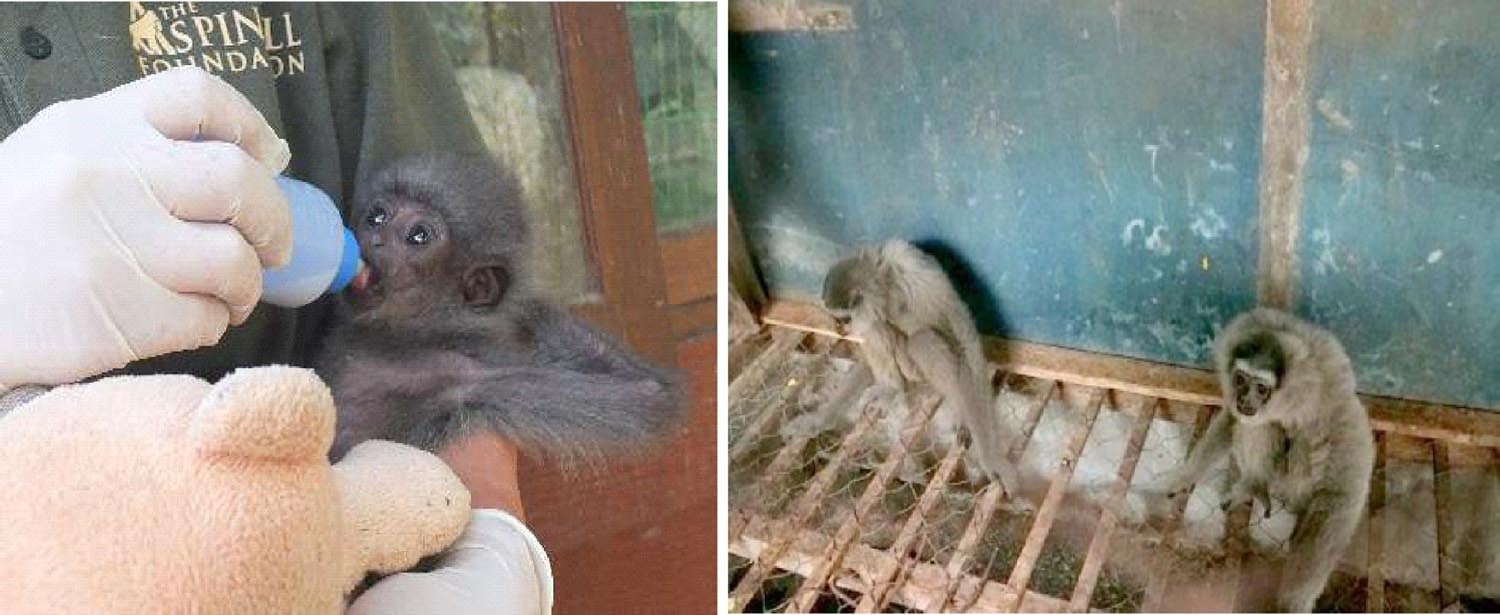Over the past few months, our Aspinall Indonesia team have been very busy across all the activities that form our Javan gibbon rehabilitation and release programme.
.jpg?width=1500&height=1000&name=2210%20Joy-Bobby%20(13).jpg)
.jpg?width=1500&height=1000&name=2210%20Joy-Bobby%20(24).jpg) Javan gibbons Joy & Bobby are transferred to the habituation cage at Mt Tilu NR © The Aspinall Foundation Indonesia
Javan gibbons Joy & Bobby are transferred to the habituation cage at Mt Tilu NR © The Aspinall Foundation Indonesia
One of the main aims of this project, which is currently co-funded by IUCN Save our Species, is to release Javan gibbons into protected areas such as Mt Tilu Nature Reserve. Many of the gibbons are wild-born animals rescued from the illegal pet trade and rehabilitated at our Javan Primate Rescue Centre where they may spend months, and sometimes years, being prepared for return to the wild.
Joy and Bobby came to the Centre in June and December 2020 respectively, both were rescue animals and now they have been transferred to the habituation cage at Mt Tilu Nature Reserve ready for the final stage of release back to the wild.
Each release is a celebration as it not only reinforces the dwindling wild population of this beautiful primate, but also a life of freedom is given back to animals caught up in the illegal pet trade. Sadly each year our Centre receives more animals rescued from a captive lifestyle that is usually inadequate and life-threateningly dangerous for their survival. Gibbons are frequently captured as babies, and most times their mothers are killed in the process. If they survive their early years they are then often kept until they become too difficult, or too sick, to manage as pets. As a consequence, our Centre will often receive animals that are either very young or older and very poorly.
 Rescued Javan gibbons arriving at our Centre in October 2022 © The Aspinall Foundation Indonesia
Rescued Javan gibbons arriving at our Centre in October 2022 © The Aspinall Foundation Indonesia
Whatever their age and condition our team in Java often provide intensive care to new arrivals. However, despite the efforts of keepers and the veterinary team it is not possible to save them all. In October this year three gibbons came into the Centre.
A young female, named Mega, estimated to be just two months old, was dehydrated on arrival. She was immediately started on milk feeds every 2 hours and is undergoing the quarantine phase in the nursery where she will remain under close supervision until she is older. Provided she can survive the trauma of capture it is hoped she will do well and be eligible for release in a few years.
The other two gibbons were adults, a male and a female. The emotional and physical damage was extensive. According to the information provided to our team the pair had been kept in captivity for about 12 years, in a cage 1 X 3 x 2 m which was unclean and full of rat droppings. They had been fed an inadequate diet of leftover rice. Both were severely malnourished, very weak and in need of intensive care.
In addition to hand-feeding tempting food, they were started on a course of multivitamins and medications to boost their recovery. Whilst the female began to show some improvement, sadly the male did not. Within a day of arrival, he was moved into the veterinary clinic where he could receive additional fluids and nursing care. Unfortunately, it was not possible to save him, and he died two weeks later. The female, named Noknok, has a long road to recovery, but we remain hopeful.
The illegal pet trade is full of shocking and sad stories. In Indonesia, gibbons have been protected since 1925, but still the trade continues, and the advent of social media has broadened the available market.
Awareness-raising and education are important in the fight against these practices, and on a wider basis, it improves the knowledge of local people in respect of other threats to biodiversity, such as habitat loss and the benefits of protecting the natural environment. Following the lifting of restrictions imposed due to the coronavirus pandemic our team have been able to resume more of their educational activities in recent weeks, including several school visits.
.jpg?width=1500&height=843&name=Education%20SD%20Kendeng%20(1).jpg) Primary school education session © The Aspinall Foundation Indonesia
Primary school education session © The Aspinall Foundation Indonesia
We believe long-term conservation success depends on a programme of activities that combine the care, rehabilitation and release of animals back to the wild with education and awareness raising for people across all age groups. In addition, our team support university students, carry out regular monitoring and patrols at release sites, and work alongside local communities and businesses, providing a comprehensive and holistic approach to our work.
This multi-faceted approach to conservation is often complex and requires a significant commitment from our team who work across numerous activities and projects within the overall Javan gibbon rehabilitation and release programme in addition to similar programmes for other primate species such as Javan langurs and grizzled leaf monkeys. It is undoubtedly hard and at times emotionally demanding work, but nothing can compare to the sight of rescued animals living once more in their natural environment in the wild.
.jpg?width=1500&height=1000&name=2210%20Udin-Lola%20(498).jpg) Released Javan gibbons Udin & Lola enjoying their freedom © The Aspinall Foundation Indonesia
Released Javan gibbons Udin & Lola enjoying their freedom © The Aspinall Foundation Indonesia
It is thanks to the incredible dedication of conservationists like our team in Indonesia, combined with the support of organisations such as the International Union for Conservation of Nature (IUCN) and generous funders that this work continues.
This project is co funded by IUCN Save Our Species. The contents of this article are the sole responsibility of The Aspinall Foundation and do not necessarily reflect the views of IUCN.

